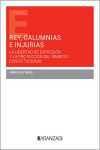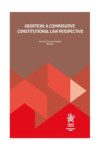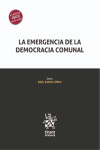SELF DETERMINATION AND SECESSION IN CONSTITUTIONAL DEMOCRACIES. A STUDY OF THE SPANISH CASE
Gaspar González Represa
Datos técnicos
- ISBN 9788411693608
- Año Edición 2023
- Páginas 464
- Encuadernación Tapa Blanda
- Idioma Inglés
Sinopsis
Secession has had a great historical importance and remains a major issue in the national and international political arena today. Secession and territorial disputes have historically been solved by force. In fact, in many recent examples force has been used to achieve independence or to preserve the territorial integrity of a state. Finding a legal solution to secession is still an open question and a particularly difficult task, which this research aims to shed some light on though.
Índice
Foreword 13
Introduction 17
PART I.
THE INTERNATIONAL AND COMPARATIVE CONTEXT
Chapter I. The right to self-determination of peoples under international law 39
INTRODUCTION 39
1. THE Principle of nationalities and the Nation-State. THE equivalence between political and cultural community 42
2. From the principle of nationalities to the principle of self-determination of Peoples: The Fourteen Points of Wilson and the Treaty of Versailles 58
3. the principle of self-determination of Peoples WITHIN the United Nations after World War II. The POSITIVATION of the Right to self-determination 67
3.1. The positivation of the right to self-determination of peoples during the decolonization period. Colonial territories as the subjects of the right 68
3.2. The new and ambiguous evolution of the right to self-determination and the secessionist cases. The codification of the principle of territorial integrity 76
4. SECESSION-REMEDY EPISODES. THE LAST STAGE IN THE EVOLUTION OF THE RIGHT TO SELF-DETERMINATION 80
5. THE TWOFOLD NATURE OF THE RIGHT TO SELF-DETERMINATION OF PEOPLES 89
5.1. Self-determination as a right of peoples: the objective and subjective scopes 90
5.1.1. The objective scope of self-determination 91
5.1.2. The subjective scope of self-determination 97
5.2. Self-determination as a duty of a third state: the principle of non-interference in the internal affairs of states 101
RECAPITULATION 106
Chapter II. The right to secede in comparative constitutional law 111
INTRODUCTION 111
1. THE PHENOMENON OF SECESSION AND ITS LEGAL ACKNOWLEDGEMENT 115
1.1. Distinction between remedial secession and democratic secession 115
1.2. The existence of a right to secede 124
1.2.1. Abstention from international law 124
1.2.2. The turn of constitutional law. A global overview of the world´s constitutions 130
2. THE TWO HISTORICAL MODELS OF ACKNOWLEDGEMENT OF A RIGHT TO SECEDE IN CASE OF AMBIGUITY IN THE CONSTITUTIONAL TEXT 145
2.1. The traditional United States model and the compact theory during the American Civil War 148
2.2. The constitutional fit of secession. The new model launched by the Supreme Court of Canada 161
2.2.1. … and that the United Kingdom followed with Scotland 176
3. THE REGULATION OF A RIGHT TO SECEDE AND ITS CLASH WITH DEMOCRATIC CONSTITUTIONALISM AND THE RULE OF LAW 188
3.1. Is it possible to constitutionalize a right to secede? 191
3.1.1. Secession and its accomplishment in constitutionalism. The due respect for the constitutional principles and its meta-constitutional nature 191
3.2. Is it advisable to constitutionalize a right to secede? 207
3.2.1. Suitability of legalizing democratic secession. The conflict between the rule of law and democratic legitimacy on the secession initiative 207
4. THE CONSTITUTIONAL PATH FOR DEMOCRATIC SECESSION. THE COLLECTIVE DEMOCRATIC WILL 225
4.1. Democratic stimulus in favour of secession that prompts the negotiations on the constitutional accommodation of secession or the exercise of a right to secede 226
4.2. Theory of the two agreements for a triple consent in the regulated procedure for secession 236
RECAPITULATION 249
PART II.
SECESSION UNDER SPANISH CONSTITUTIONAL LAW
Chapter III. Attempts to find a legal channel for secession 261
INTRODUCTION 261
1. THE ATTEMPTS BY THE LEHENDAKARI IBARRETXE 264
1.1. The Plan Ibarretxe. The amendment of the Basque Statute of Autonomy rejected by Congress 264
1.2. The Basque consultation law 9/2008 270
2. EL PROCÈS 274
2.1. The 2006 amendment of the Statute of Autonomy of Catalonia 274
2.2. The first independence query on 9 November 2014 278
2.3. The disconnection laws, the referendum on 1 October 2017 and the UDI 286
RECAPITULATION 295
Chapter IV. The actuality of the constitution. The existence of legal channels for secession 301
INTRODUCTION 301
1. THE FEASIBILITY OF THE REMEDIAL-SECESSION IN SPAIN 302
1.1. On the grounds of serious violations of fundamental rights 307
1.1.1. Protection of rights, constitutionalism and rule of law. Guarantees for rights in the Spanish Constitution 308
1.1.2. Violations of rights alleged by the independence movements 313
1.2. On the grounds of an infringement of the internal self-determination of an AC 322
1.2.1. Internal self-determination in a constitutional democracy and its configuration in Spain 323
1.2.2. Infringements of internal self-determination alleged by the independence movements 329
2. THE CONSTITUTIONAL SCHEME CHOICE ON DEMOCRATIC SECESSION. THE IMPLICIT PROHIBITION OF SECESSION 339
2.1. Independence movements in Spain as episodes of democratic secession 340
2.2. The Spanish constitutional scheme on democratic secession of sub-state entities 348
3. THE RIGHT TO DECIDE. THE PROHIBITION OF CONSULTING ON SECESSION 358
3.1. The scope of the right to decide provided by the independence movements 359
3.2. Constitutionality of the scope provided to the right to decide 365
RECAPITULATION 372
Chapter V. The potentiality of the constitution. Prospects of a legal channel for secession 377
INTRODUCTION 377
1. IS IT POSSIBLE TO RECOGNISE A RIGHT TO SECEDE UNDER SPANISH CONSTITUTIONAL LAW? 380
2. WHEN IS IT ADVISABLE TO RECOGNISE A RIGHT TO SECEDE UNDER SPANISH CONSTITUTIONAL LAW? 397
3. The constitutional path for democratic secession under Spanish Constitutional Law 412
RECAPITULATION 422
Conclusions 427
References 445
Otros libros que te pueden interesar
- ¿Quiénes somos?
- Gastos de envío
- Política de privacidad
- Políticas de devolución y anulación
- Condiciones Generales de contratación
- Contacto
2025 © Vuestros Libros Siglo XXI | Desarrollo Web Factor Ideas










